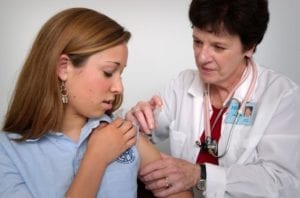Thirteen Floridians Injured by Tenn. Compounding Pharmacy Injection
According to the Centers for Disease Control and Prevention (CDC), there have been 20 patients injured by a Tennessee compounding pharmacy preparation, including 13 patients in Florida.
The Main Street Family Pharmacy of Newbern, Tennessee recalled its lots of sterile product after an outbreak of skin abscesses, one of which appears to be fungal. The steroid injections were distributed nationwide. Two Brevard County, Florida facilities also received the injections including The Back Center of Melbourne and a doctor’s office.
The FDA is working with the CDC to identify all patients suffering adverse events from the administration of preservative-free methylprednisolone acetate (MPA) (80 mg/mL) by intra-muscular injection.
Described as “skin and soft tissue infection of unclear etiology,” no other drugs from the Tennessee compounding pharmacy have caused any problems in patients. The FDA recommends no products labeled as sterile from the Main Street pharmacy be administered.
The steroid pain medication is the same preparation made by the New England Compounding Center (NECC). Last year a rare form of fungal meningitis made by NECC killed 53 patients and exposed as many as 14,000 patients. That pharmacy has since filed for bankruptcy.
The incident brought to light the fact that many compounding pharmacies are not being regulated by either the FDA or states.
On May 22, the U.S. Senate approved legislation designed to tighten control over compounding pharmacies by creating a new category of regulation within the FDA. Under the proposed regulation – The Pharmaceutical Compounding Quality and Accountability Act – traditional compounding pharmacies, that is, those that prepare small preparations for individual patients will be regulated by the State Boards of Pharmacy.
Larger facilities that offer products for the industry and sell across state lines, especially when there is a drug shortage, will be renamed compounding manufacturers and will fall under FDA regulation. One requirement will be to register and follow a national uniform set of rules under the oversight of a pharmacist, reports Space Coast Daily.
Meeting with resistance is the U.S. Public Interest Research Group (PIRG) that believes large pharmacies would receive an exemption if they make gels, topical creams or oral drugs. Pills would not be covered and a compounder that does not ship over state lines would also be exempt, reports the Washington Post.
Public Citizen meanwhile believes compounding drugs should be regulated the same way as other drugs are regulated, having to prove safety and efficacy before being sold.
Share This



